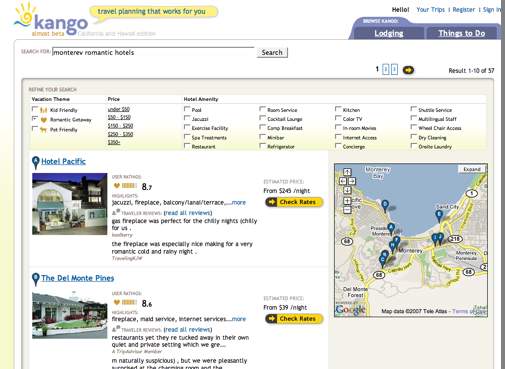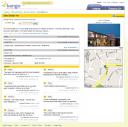 Does the world really need another travel site? With Expedia, Orbitz, Travelocity, TripAdvisor, Farecast, TripHub, Yapta, and many more, prospective travelers already have more than enough to choose from. (With an estimated $87 billion in travel booked online, it’s no wonder why). Soon they will be able to add Kango to that list.
Does the world really need another travel site? With Expedia, Orbitz, Travelocity, TripAdvisor, Farecast, TripHub, Yapta, and many more, prospective travelers already have more than enough to choose from. (With an estimated $87 billion in travel booked online, it’s no wonder why). Soon they will be able to add Kango to that list.
The startup, which has been in stealth-mode until now, does manage to add a new twist to search travel. It is indexing 18 million opinions and reviews across 1,000 travel-related sites to derive the best travel search results based on what type of trip you want to take. If you are planning a romantic getaway in Big Sur, you will get one set of results. If you specify that you are looking for a family outing instead, you will get another. Or you can look for pet-friendly hotels and activities. Of course, you can also search by price or amenity, like any other travel site. And you can see where each hotel or activity is located on a small Google Map.
 But what’s promising about Kango is the way it slices up search subjectively. Kango is building a semantic search engine focussed narrowly on travel. It parses the language in all of those reviews and guides, and categorizes them by generating tags for them. “You cannot wait for users to add tags, you have to derive them,” says CEO Yen Lee. So hotels that have been reviewed across the Web (on sites like Yahoo Travel, TripAdvisor, or Yelp) with words such as “perfect,” “relaxing,” “couples,” “honeymoon,” or “spa” would rank higher in a search for romantic travel. Hotels associated with the words “kitchen,” “pool,” and “kids,” would rank higher in a search for family trips.
But what’s promising about Kango is the way it slices up search subjectively. Kango is building a semantic search engine focussed narrowly on travel. It parses the language in all of those reviews and guides, and categorizes them by generating tags for them. “You cannot wait for users to add tags, you have to derive them,” says CEO Yen Lee. So hotels that have been reviewed across the Web (on sites like Yahoo Travel, TripAdvisor, or Yelp) with words such as “perfect,” “relaxing,” “couples,” “honeymoon,” or “spa” would rank higher in a search for romantic travel. Hotels associated with the words “kitchen,” “pool,” and “kids,” would rank higher in a search for family trips.
Whether this will be enough to draw people from other travel sites is hard to say at this point. But Kango’s executive team has an impressive pedigree. Lee is a former general manager of Yahoo Travel. His search architect, Huanjin Chen, used to be the search architect at eBay. His natural-language search scientist, Boris Galitsky, used to do work for the British government. And his head of marketing, Elliott Ng, headed up marketing for Intuit’s QuickBooks and is the founder of Netcentives.
Lee estimates there are 6 billion to 8 billion travel-related searches done every year, and he thinks Kango can help expose more of the hidden gems in travel that today don’t quite make it to the first page of most travel sites. He plans to make money on travel-specific search advertising, rather than on booking or listing fees.
Kango will be rolling out a limited beta in the next few weeks, and is reserving 100 spots for TechCrunch readers who sign up here.

